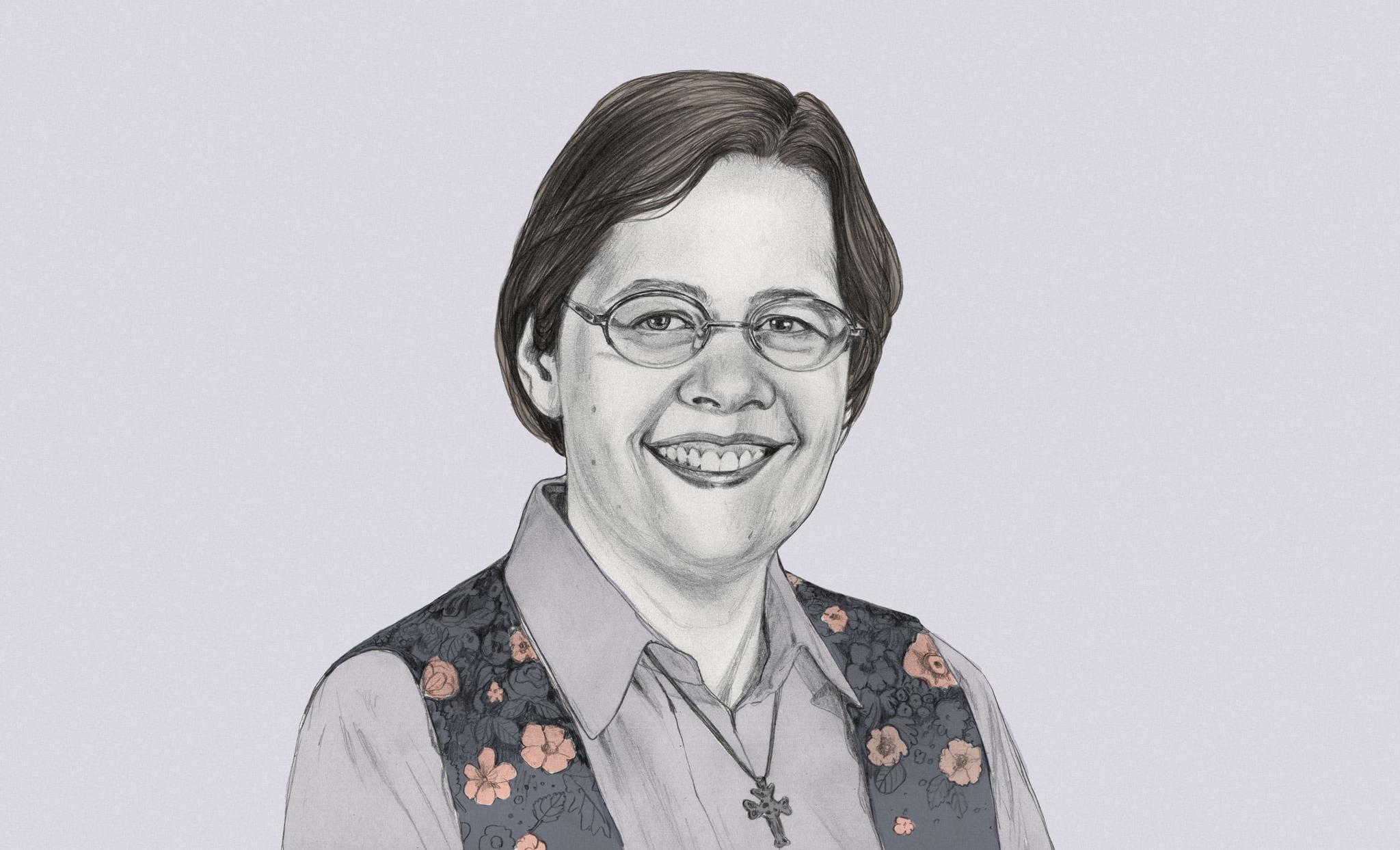
Money Diaries
A Nun Tells Us What It's Like to Live With a Vow of Poverty
As a Sister of St. Joseph, Amy Hereford lives a financial life that's a lot different from most of us. But she thinks the lessons from it apply to us all.
Wealthsimple makes powerful financial tools to help you grow and manage your money. Learn more
Wealthsimple is a whole new kind of investing service. This is the latest installment of our recurring series “Money Diaries,” where we ask interesting people to open up about the role money has played in their lives.
I’m a Sister of St. Joseph, so I have a vow of poverty. What’s a vow of poverty? How does it work? What does it require? There are books, reams, volumes, whole shelves in libraries that discuss the nature of what it is. It’s one of those concepts you could gnaw on for hours, like What is love? What is truth? It means different things to different people. But basically, it’s a commitment to living simply and communally. I'm a Sister of St. Joseph — we don’t own things privately. We hold everything in common. It’s an interesting world. Being inside of it, you get used to it, but then you start to explain it to somebody, and you say, “This is crazy!” Maybe not crazy, but it’s so different from the dominant paradigm. It’s kind of like socialism on a small scale—everybody contributes what they can, everybody gets what they need.
Currently, I live in an ecovillage on the outskirts of St. Louis, in a rented house with four other sisters. The ecovillage consists of our group and several neighborhood people, all committed to living simply, growing our own food, doing a lot of native planting, and sustainability. So I’m farming again! I love, love, love gardening. Even so, I’m a lazy gardener. I do permaculture, which focuses on working with nature and keeping your labor and supplies at a minimum.What I grow, we eat. So my gardening and food expenses come to about 100 a month. I’m a simplicity freak. I don’t need or want a lot of stuff. I’m leaving for a six-week trip—to Rome and then Ireland—and I’ve fit everything I need into one carry-on. I have a computer, of course, and it’s for my use, but it’s communally owned. I really don’t find myself wanting things. I mean, we do allow some personal expenses—like books or movies or chocolate. I guess if I have one thing I wish for, it’s plants. Sometimes I want ones that we can’t afford. But recently, I actually got a grant to purchase currant, blueberry, blackberry, and gooseberry plants. I mean, it would’ve taken me ten years of saving up to buy those!
I sense more and more interest from laypeople in our way of life.

Sign up for our weekly non-boring newsletter about money, markets, and more.
By providing your email, you are consenting to receive communications from Wealthsimple Media Inc. Visit our Privacy Policy for more info, or contact us at privacy@wealthsimple.com or 80 Spadina Ave., Toronto, ON.
It’s a kind of traditional Christian way of living. If you read the Acts of the Apostles, there’s a passage that reveals that the early Christians lived communally. If they’d had houses and land, they sold them and shared the proceeds with the community. “There was not a needy person among them,” the author writes. There’s also a well-known passage in the Gospel of Luke in which Jesus tells an anxious follower who wants to ensure his eternal life in heaven: Sell your possessions, give your money to the poor, and follow me.
But the way we live, it’s not a vow to be impoverished; it’s really a commitment to have each other’s back.
I grew up partly in St. Louis and partly out in the rural area west of the city. My mom was a nurse, my dad was an engineer; he worked on the space program. So I grew up on a farm, and my dad’s a rocket scientist—that’s a little weird, right there. I’m also one of ten kids, and interestingly, we’re all in different fields. I entered my community, the Sisters of St. Joseph, right after college. I’ve lived communally with the sisters for almost forty years now, but really I’ve lived that way since I was about two years old. Nine siblings? That’s where I learned community organizing.
I’m a lawyer by training. I took premed as an undergrad, and then I went on to study civil and canon law—that is, church law. I work with nonprofits and different religious communities on their legal issues. I charge hourly or day rates, depending on the job, but any money I make goes to the Sisters of St. Joseph. I don’t pocket any of it. That’s true of all of us who are able to work paying jobs: teachers, nurses, administrators—we even have one sister who works in a private clinic as a dental hygienist. Now, where you use the word “job,” we would say “ministry.” We ask, “How can I use my gifts to serve others?” And that’s the work we do. For me, it’s being a lawyer.
With the money we have, every year we each make out a budget for food, rent, and utilities, travel or education, and submit it. Those budgets are approved by a central committee, and money is disbursed into group accounts that are held by the Sisters of St. Joseph, but where we are signatories. Whatever we don’t use for our own needs, we turn back in to the ministry and funnel into projects we think are important. When younger sisters first come into the order, they’re committed to living this way, but I think that first time they hand their paycheck over can be a jolt—Oh, this is real.
For me, it was never really a problem. Even as a kid, I wasn’t really into having things. I was really into books. And I’m a musician, so when I was in college, I used to love shopping for guitars—not buying, just looking for my ideal guitar, one that I would own when I had enough money. I do have a guitar now, but I had to request it in my budget, and since I play at church, it was approved. When we first came into the order, we wouldn’t put our names on things—we would label possessions like this, “For the use of Amy Hereford”—to bring home the point that we didn’t own this laptop or that musical instrument, even if we were the primary users. But they don’t do that anymore. It’s the internal attitude that’s important.
My order, the Sisters of St. Joseph of Carondelet, has provinces in Albany, St. Paul, Los Angeles, and St Louis, where I am. Some sisters live in the motherhouse, some in convents, some in our eldercare facility, but most of us live in small groups in houses or apartments. The tricky thing with religious life now is that we know a lot of the communities are coming to the end of their life cycles. Many of these religious communities have been around for a long time. The Sisters of St. Joseph of Carondelet was originally founded in France in 1650. And with groups like mine, usually you have a younger generation of sisters coming in; they’re the earners, and they support the older people. But right now, we’re top heavy—the younger generation is sometimes not there. Where I serve, in the St. Louis province of the Sisters of St. Joseph, there are 300 of us, and only about six or seven are under sixty. I’m one of that group. It’s very small.
There's real value in showing people it
It’s a huge problem. We’re talking about 50,000 Catholic sisters in the United States, and most of them belong to orders that are underfunded for their retirement. Now, my community says it’s fully funded, but obviously that’s a moving target. You can think you’ve got that nest egg tucked away, and then something happens in the market and it’s, like, whoops!
Almost forty years ago, I made this commitment to living together and sharing our resources.With the exception of possibly being underfunded—which could be a problem for me when I retire—I don’t worry about what I’m going to eat or what I’m going to wear. And I really never have. If I lose a job, my community can tide me over until I get something else. I think there’s a real value in living this way as a model. To show people, you know what, it is possible to live in this kind of sharing economy, and it actually works quite well. In fact, it has worked for centuries, but it takes a commitment on everybody’s part to do that. Even in our ecovillage, there are some higher wage earners and lower wage earners, and you come to a potluck, and you get some really classy dishes and you get some, you know, hot dogs.Vegetarian hot dogs.
I sense more and more interest from laypeople in our way of life. Sometimes when I look at how much stuff people have, and the worry over holding on to it and being able to afford more stuff, I think, Oh my gosh, life could be so much simpler! But there’s a lot that goes into getting a group of people together in this way. In religious life, at least, we know there are some basic shared values, so it makes it a whole lot easier for us than these other groups that have to talk about everything imaginable, including: Do we or do we not share income? Do we share housing? Do we share gardening, childcare? We basically have that worked out. But we do still have to negotiate them from time to time.
I do a lot of the gardening here. The other sisters will help, but they said, “If you take care of the outside, we’ll take care of the inside.” I’m like, “That is the best deal I’ve ever had.” And now I’m off to Rome. So you see, this vow of poverty stuff isn’t all that bad.
As told to Kathy Dobie exclusively for Wealthsimple. Illustration by Jenny Mörtsell. We make smart investing simple and affordable.
Wealthsimple's education team is made up of writers and financial experts dedicated to making the world of finance easy to understand and not-at-all boring to read.









